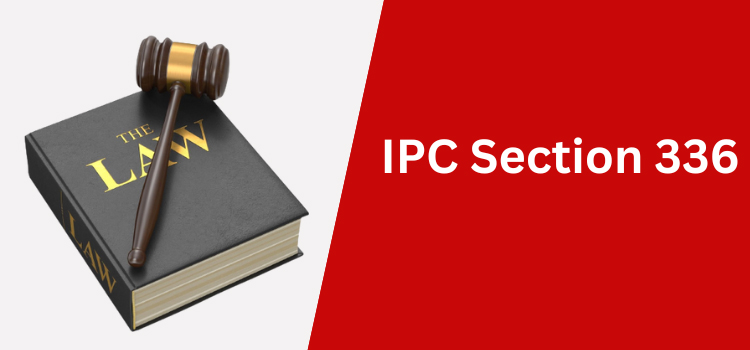IPC Section 336
Posted On : June 29, 2023

Table of Contents
Introduction
In the Indian Penal Code (IPC), Section 336 deals with the offense of causing grievous hurt by an act endangering life or personal safety. This legal provision seeks to protect individuals from intentional or negligent actions that pose a significant risk to their lives or personal safety. This article aims to provide a comprehensive understanding of IPC Section 336, its elements and punishments.
IPC Section 336: Overview and Definition
IPC Section 336 outlines the offense of causing grievous hurt by an act that endangers life or personal safety. The term “Grievous Hurt” refers to injuries that are severe or cause permanent damage to the victim's health or body.
IPC Section 336 states, "Whoever does any act so rashly or negligently as to endanger human life or the personal safety of others shall be punished with imprisonment of either description for a term which may extend to three months, or with fine which may extend to two hundred and fifty rupees, or with both."
Essentially, this section deals with acts that are performed with recklessness or negligence, leading to a risk of harm to human life or personal safety. It covers a broad range of situations where an individual's actions put others in danger, even if no serious harm is caused.
Elements of IPC Section 336
To establish an offense under IPC Section 336, the following elements must be present:
-
Act endangering life or personal safety
The accused must engage in an act that jeopardizes the life or personal safety of another individual. This act can be either intentional or negligent. -
Grievous hurt caused
The act must result in grievous hurt to the victim. Grievous hurt involves severe injuries that cause substantial harm to the victim's health, body, or limbs. -
Causation
There must be a direct link between the act endangering life or personal safety and the grievous hurt caused. The act should be the proximate cause of the injuries suffered by the victim.
Significance and Application of IPC Section 336
IPC Section 336 plays a crucial role in maintaining public safety and ensuring that individuals are held accountable for their actions. It serves as a deterrent against reckless behavior that can potentially endanger lives and personal safety.
The provision is applicable in various scenarios, such as reckless driving causing endangerment to pedestrians or other motorists, negligence in handling hazardous substances that could harm people, or any act that puts others' lives or personal safety at risk.
It is important to note that Section 336 focuses on the act itself rather than the outcome or the actual harm caused. This approach recognizes the potential dangers associated with recklessness or negligence and holds individuals accountable for their actions, irrespective of whether harm was inflicted.
Punishment and Penalty
As per IPC Section 336, the offense is categorized as a bailable and non-cognizable offense. The maximum punishment for committing an offense under this section is imprisonment for up to three months, or a fine of up to two hundred and fifty rupees, or both.
It is important to note that the court has the discretion to determine the appropriate punishment based on the severity of the act and its potential consequences. Factors such as the degree of recklessness, the presence of intent, and the actual harm caused will be taken into consideration during sentencing.
Conclusion
IPC Section 336 serves as a vital legal provision for addressing acts that endanger life or personal safety and cause grievous hurt to individuals. It helps in deterring intentional or negligent conduct that poses substantial risks to others. By understanding the elements and punishments outlined in this section, both the public and legal professionals can ensure the proper application of the law and the protection of victims' rights. To more about IPC Section 336, you should consult a criminal lawyer in your jurisdiction. If you are staying in Kolkata, it is advisable to consult a criminal lawyer in Kolkata.
FAQs
-
What is Section 305 IPC?
According to Section 305, abetment of suicide of a juvenile or insane person is a crime punishable under the Indian Penal Code. -
What is Section 305 and 306 of the IPC?
Abetment to Commit Suicide (Sections 305 and 306 of the Indian Penal Code of 1860) A violation of Section 305 of the IPC is punishable, while a violation of Section 306 of the IPC is punishable if the accused assisted another person in committing suicide. -
What is the IPC 305 to 309?
Anyone who aids in the suicide of a person under the age of 18, a person who is mad, a person who is intoxicated, or a person whose mind is not in a stable state is subject to punishment under this clause. -
What is the case number 305?
According to Section 305, abetment of suicide of a juvenile or insane person is a crime punishable under the Indian Penal Code.
























